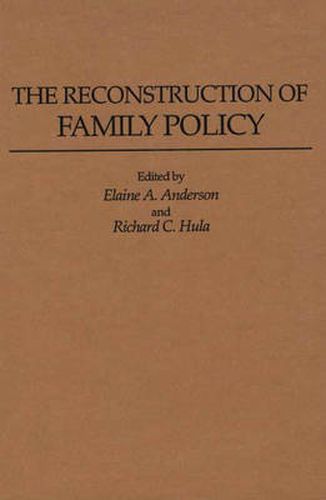Readings Newsletter
Become a Readings Member to make your shopping experience even easier.
Sign in or sign up for free!
You’re not far away from qualifying for FREE standard shipping within Australia
You’ve qualified for FREE standard shipping within Australia
The cart is loading…






In recent years, the appropriate role of government in society has been subjected to a sweeping re-evaluation throughout the world. An important element in this continuing debate has been a reappraisal of the form and magnitude of public social welfare policy. The essays which make up this volume examine a variety of aspects of this topic as it applies to family policy in the United States, including both the political debate about who should be served and how programmes should be funded, and the intellectual questions surrounding the nature of social organization and its role within the state. Divided into three major subject areas, the work re-examines basic elements of current policy debate surrounding family life. The first section explores fundamental features of family policy, considering whether there is a conflict of interest between adults and children in fashioning social policy, and outlining the parameters of a feminist family policy. The second section examines the linkage between ideology and action, covering such topics as the link between state political culture and family policy, latchkey children, treatment of the nation’s elderly and its link to a mythical past, abortion, and family policy in the People’s Republic of China. In the final part of the book, a number of specific policies are analyzed, including AFDC programme cutbacks, the decline in family planning resources, non-family-based care and joint custody arrangements. A concluding chapter discusses the future of family policy.
$9.00 standard shipping within Australia
FREE standard shipping within Australia for orders over $100.00
Express & International shipping calculated at checkout
In recent years, the appropriate role of government in society has been subjected to a sweeping re-evaluation throughout the world. An important element in this continuing debate has been a reappraisal of the form and magnitude of public social welfare policy. The essays which make up this volume examine a variety of aspects of this topic as it applies to family policy in the United States, including both the political debate about who should be served and how programmes should be funded, and the intellectual questions surrounding the nature of social organization and its role within the state. Divided into three major subject areas, the work re-examines basic elements of current policy debate surrounding family life. The first section explores fundamental features of family policy, considering whether there is a conflict of interest between adults and children in fashioning social policy, and outlining the parameters of a feminist family policy. The second section examines the linkage between ideology and action, covering such topics as the link between state political culture and family policy, latchkey children, treatment of the nation’s elderly and its link to a mythical past, abortion, and family policy in the People’s Republic of China. In the final part of the book, a number of specific policies are analyzed, including AFDC programme cutbacks, the decline in family planning resources, non-family-based care and joint custody arrangements. A concluding chapter discusses the future of family policy.